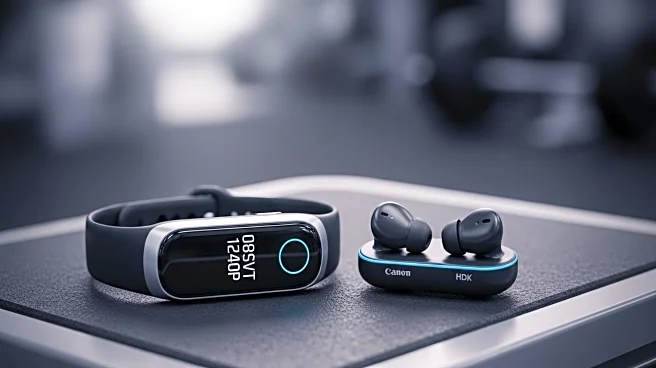What's Happening?
CNET's resident fitness expert has compiled a list of top fitness tech items that have proven to be highly effective and recommendable. Over the past four years, the expert has tested various fitness technologies, including treadmills, smart rings, and smart home gyms. Among the highlighted items are the Hyperice Normatec Go compression boots, which are compact and ideal for post-workout recovery, and the Apple Watch Series 11, noted for its FDA-cleared hypertension alerts and improved battery life. The Theragun Mini 2 and Theragun Pro (5th gen) are recommended for muscle recovery, while the Oura Ring 4 offers comprehensive health tracking. The Tonal 2 smart home gym and Peloton Bike are praised for their innovative approaches to strength training and cycling, respectively. Additionally, the Beats Powerbeats Pro 2 earbuds and the Future app, which connects users with personal trainers, are featured for enhancing workout experiences.
Why It's Important?
The integration of advanced fitness technology into daily routines is transforming how individuals approach health and wellness. These tech items not only provide convenience and efficiency but also offer personalized insights into health metrics, which can lead to better health outcomes. For instance, the Apple Watch's hypertension alerts can prompt users to seek medical advice, potentially preventing serious health issues. The Oura Ring's sleep tracking capabilities can help users optimize their rest, improving overall well-being. The availability of smart home gyms like Tonal 2 allows for comprehensive strength training at home, reducing the need for gym memberships and making fitness more accessible. As these technologies become more prevalent, they are likely to influence consumer behavior, driving demand for more personalized and data-driven fitness solutions.
What's Next?
As fitness technology continues to evolve, consumers can expect further innovations that enhance user experience and provide even more detailed health insights. Companies may focus on integrating artificial intelligence to offer more personalized fitness plans and real-time feedback. The expansion of virtual fitness platforms, like the Future app, suggests a growing trend towards remote personal training, which could become a standard in the fitness industry. Additionally, as more people adopt these technologies, there may be increased collaboration between tech companies and healthcare providers to ensure the accuracy and reliability of health data collected by these devices.
Beyond the Headlines
The rise of fitness technology also raises questions about data privacy and the ethical use of personal health information. As devices collect more detailed health metrics, companies must ensure robust data protection measures are in place to safeguard user information. Furthermore, the accessibility of these technologies may highlight disparities in health and fitness opportunities, prompting discussions on how to make advanced fitness solutions available to a broader audience. The cultural shift towards tech-driven fitness could also influence societal norms around health and wellness, emphasizing the importance of data-informed decision-making in personal health management.










